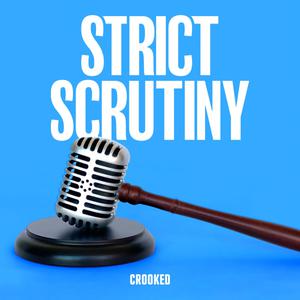
The Ginsburg Tapes
Lauren Moxley Beatty
Lauren Moxley Beatty
- 54 minutesWe Won’t Settle for Tokens (Finale Rebroadcast)
Episode 8 [Rebroadcast]: Lauren breaks down the final tape of Ginsburg’s career as an advocate before the Supreme Court, and reflects on what she’s learned through this project.
Questions for Lauren? Shoot her an email at [email protected], or find her on Twitter @laurenmoxley.
12 October 2020, 10:00 am - 1 hour 5 minutesRide on Its Skirttails (Rebroadcast)
Episode 7 (Rebroadcast): After Leon Goldfarb’s wife, Hannah Goldfarb, passed away, he was denied benefits available to sole surviving spouses that he would have obtained if their gender-roles were reversed. Ruth Bader Ginsburg represented Leon in challenging the law.
The government argued that Ginsburg wanted to “characterize this as a women’s rights case because the cause of women’s rights is now a fashionable one,” and Ginsburg “seeks to ride on its skirt tails.” Ginsburg argued that laws discriminating against men were actually a two-edge sword, reflecting and perpetuating stereotypes about the expected roles of men as well as women. She also showed that the “cause of women’s rights” was far from a passing trend.
In the second part of the episode, Lauren will explore the legacy of the partial victory of intermediate scrutiny, the end result of Ginsburg’s effort to locate sex equality in the Constitution. She will also discuss the intertwined legacy of the failure to pass the Equal Rights Amendment in the 1970s.
Questions for Lauren? Shoot her an email at [email protected], or find her on Twitter and Instagram @ginsburgtapes.
1 October 2020, 7:11 pm - 51 minutes 53 secondsNear Beer and the Middle Tier (Rebroadcast)
Episode 6 (Rebroadcast): When did the Supreme Court finally raise the bar for sex equality under the Constitution? In a case about beer.
In Oklahoma, women could buy 3.2% alcohol beer at 18, but men had to wait until they turned 21. Two fraternity brothers at Oklahoma State University teamed up with a co-owner of a local convenience store, the Honk n’ Holler, to challenge the law, and the case went all the way to the Supreme Court. The colorful “Ranger Fred” argued the case, with key support from Ruth Bader Ginsburg. It is in this case about beer that the Supreme Court finally provides a clear standard that applies when sex discriminatory laws are challenged under the Equal Protection Clause—by carving out a middle tier.
Questions for Lauren? Shoot her an email at [email protected], or find her on Twitter and Instagram @ginsburgtapes.
27 September 2020, 1:47 pm - 1 hour 5 minutesNot a Pedestal, But a Cage (Rebroadcast)
Episode 5 (Rebroadcast): After Stephen Wiesenfeld’s wife Paula died giving birth to their son, he was denied benefits available to sole surviving mothers with modest incomes. Had Stephen and Paula’s places been reversed, Paula would have received those benefits. Ruth Bader Ginsburg represented Stephen in challenging the social security law. She used the case to show how a law purporting to benefit mothers by providing them special benefits actually perpetuated and reinforced the stereotype that men belong at work, and women at home.
Questions for Lauren? Shoot her an email at [email protected], or find her on Twitter and Instagram @ginsburgtapes.
25 September 2020, 2:08 am - 1 hour 43 secondsMake Us Serve (Rebroadcast)
Episode 4 (Rebroadcast): Edwards v. Healy involved a challenge to a Louisiana law that excused women from the duty to serve on juries. In Ruth Bader Ginsburg’s third oral argument before the Supreme Court, she tried to get the Court to overturn a ruling of just 13 years earlier upholding a volunteers-only jury scheme for women–which the Court upheld on the grounds that women are “the center of home and family life.” This tape allows us to explore how equal rights for women require equal duties for women.
Questions for Lauren? Shoot her an email at [email protected], or find her on Twitter and Instagram @ginsburgtapes.
22 September 2020, 10:27 am - 22 minutes 21 secondsPregnancy Discrimination Cases of the 1970s (Rebroadcast)
Episode 3 (Rebroadcast): At the same time that Ruth Bader Ginsburg was arguing the sex equality cases that we’re focusing on in this podcast, the Supreme Court also heard a number of pregnancy discrimination cases. In each case, the Burger Court struggled to see how pregnancy discrimination is a function of sex. In their minds, pregnancy is different. The pregnancy discrimination cases are an important piece of the puzzle in seeking to understand the ways in which the Burger Court advanced sex equality—and the ways that it didn’t.Questions for Lauren? Shoot her an email at [email protected], or find her on Twitter and Instagram @ginsburgtapes.
21 September 2020, 12:27 am - 1 hour 7 minutesThe Blind, the Lame, and the Women (Rebroadcast)
Episode 2 (Rebroadcast): Ruth Bader Ginsburg only lost one case as an oral advocate in the Supreme Court: Kahn v. Shevin. The case involved a challenge to a Florida law according a special tax exemption to female widows, but not male widowers. Every widow got the tax exemption, regardless of her income–even the wealthy widowed woman of Palm Beach. Ginsburg tried to show the Court how the law was built upon and perpetuated an assumption of women’s economic dependency upon men.
The Court didn’t buy it. In fact, one of the four justices to vote for strict scrutiny for laws discriminating on the basis of sex in Frontiero (see Ep. 1)–Justice William O. Douglas–defects. He authors the opinion in the only case that Ginsburg ever lost. Why? His mother.
Questions for Lauren? Shoot her an email at [email protected], or find her on Twitter and Instagram @ginsburgtapes.
20 September 2020, 1:44 am - 1 hour 1 minuteFeet Off Our Necks (Rebroadcast)
Episode 1 (Rebroadcast): Ruth Bader Ginsburg made her debut as an oral advocate in the Supreme Court in Frontiero v. Richardson. The case involved a challenge to a law that treated men and women serving in the military differently. Specifically, Air Force Lieutenant Sharron Frontiero was denied dependent’s benefits for her husband, a navy veteran who had gone back to college. Had the sex roles been reversed, the wife would have obtained the benefits.
Arguing as an amicus on behalf of the ACLU Women’s Rights Project, Ginsburg showed how the law served to perpetuate stereotypes and cement traditional gender roles (woman as homemaker, man as breadwinner), without regard to individual ability, opportunity, or choice.
Questions for Lauren? Shoot her an email at [email protected], or find her on Twitter and Instagram @ginsburgtapes.
19 September 2020, 5:03 am - The Equal Rights Amendment is Back in the Courts
In case you missed it, the fight for the Equal Rights Amendment rages on–this time, in the courts.

Crash course: for the Equal Rights Amendment to become part of the Constitution, 38 states need to ratify it. Congress sent the Amendment to the states in 1972, and 35 states ratified it between 1972 and 1978. But then for nearly 40 years, the Amendment lay dormant.
In the midst of #MeToo, the backlash to the overt sexism of the Trump administration, and the rise of feminism as a mainstream viewpoint, the three-state strategy took hold. Between 2017 and 2020, Nevada, Illinois, and Virginia ratified the Amendment, reaching the 38-state threshold to become part of the Constitution.
In 2020, the three recently ratifying states–Virginia, Illinois, and Nevada (“Pro-ERA States”)–sued the National Archivist, David Ferriero. They argued that with their ratifications, the U.S. Constitution now declares, once and for all, that equality of rights under the law shall not be denied or abridged on account of sex. They asked the court to (1) declare that the ERA is now part of the Constitution and (2) to order the National Archivist to publish the Amendment as part of the Constitution.
But the Pro-ERA states face a few doctrinal hurdles. First, the preamble to the ERA contains a deadline for ratification (originally 1979, Congress extended to 1982). Second, five states have supported to rescind their ratifications of the ERA (Idaho, Kentucky, Nebraska, Tennessee, and South Dakota). Third, the defendants argue that Pro-ERA states lack standing to bring their lawsuit, and that their claims are political questions that belong in Congress rather than the courts.
The National Archivist was joined by three of the states that have purported to rescind their ratifications (Nebraska, Tennessee, and South Dakota), along with Alabama and Louisiana (collectively, “Anti-ERA States”), who intervened in the case to oppose the lawsuit.
Here are the key briefs in the litigation thus far:
- Pleadings:
- Briefing:
- The National Archivist’s Motion to Dismiss the Lawsuit.
- The Pro-ERA States’ Opposition to Motion to Dismiss the Lawsuit.
- Amicus Briefs (Proposed):
- In support of the Pro-ERA States:
- In support of the National Archivist and Anti-ERA States:
- The Eagle Forum
- [Update July 16, 2020]: Independent Women’s Law Center
- [Update July 24, 2020:] Concerned Women for America
- In support of neither party:
- [Update July 6, 2020]: Anti-ERA States’ Motion for Summary Judgment
Some of these briefs focus particularly on doctrinal hurdles discussed above. But many also address the core values that the Equal Rights Amendment represents. It is amazing to watch many of the same debates that we focused on in the Ginsburg Tapes play out again, nearly fifty years later.
*I represented Generation Ratify and other youth groups as amicus parties in support of the Pro-ERA states. This blog represents my views in my personal capacity.
3 July 2020, 3:09 pm - 54 minutesWe Won’t Settle for Tokens
Episode 8: Lauren breaks down the final tape of Ginsburg’s career as an advocate before the Supreme Court, and reflects on what she’s learned through this project.
Questions for Lauren? Shoot her an email at [email protected], or find her on Twitter @laurenmoxley.
12 March 2020, 11:00 am - More Episodes? Get the App
Your feedback is valuable to us. Should you encounter any bugs, glitches, lack of functionality or other problems, please email us on [email protected] or join Moon.FM Telegram Group where you can talk directly to the dev team who are happy to answer any queries.
 Strict Scrutiny
Strict Scrutiny